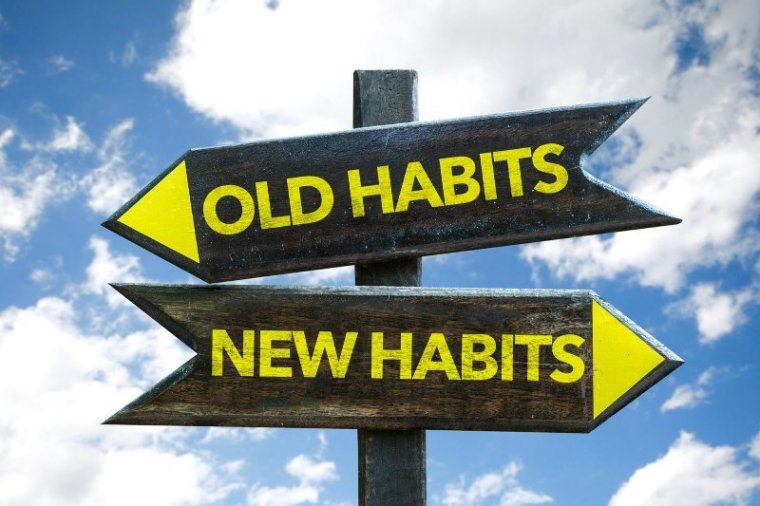
What’s next
As we come to the end of the year a lot of people are asking questions about 2021. What will change that will be different from 2020? Has the COVID19 pandemic really changed our society? Will we work from home more? What new rhythms will the church have into the future? Can I lose my lockdown weight gain?
Having turned 50 in the middle of 2020 I’ve realised that breaking habits and creating a new normal gets a little harder as you get a little older.
Breaking habits
Hitting the snooze button a few times too many; biting your nails; falling asleep in front of the TV; not reading your Bible enough. These are just a few examples of habits people often try to break.
Breaking a habit isn’t as simple as merely deciding to stop a certain behaviour or deciding to start another one, though that’s a great start. It takes time and dedicated effort to get rid of old habits and start new ones. I’ve heard it said many times that it only takes 21 days to break a habit but I’ve also heard others suggesting it takes a lot longer, sometimes as long as several months. My personal experienced is, mixed.
How long does it take?
Experts attribute the ‘21 days to break a habit’ myth to Dr Maxwell Maltz, who worked as an American plastic surgeon before becoming a psychologist. He suggested people needed about three weeks to get used to:
· different facial features after plastic surgery.
· the absence of a limb after amputation.
· a house they have just moved into.
These suggestions may have some truth to them, but Maltz seems to have relied on patient reports instead of scientific evidence. Another key issue is that none of the above are habits people want to break. Rather, these examples describe habituation, or the process of becoming accustomed to something new. Getting used to a new experience does share some similarities with making personal changes, but it is not entirely the same thing.
Breaking a personal habit, or creating a new habit tends to involve more consistent, conscious effort.
The time it really takes to break a habit depends on a range of things, including:
· How long you have had the habit.
· Whether you have fully integrated the behaviour into your life.
· What rewards (social, physical, or emotional) you get from it.
· Whether other behaviours reinforce the habit.
· Your motivation.
For example, people who drink socially can pick up this habit because it makes it easier to meet up with friends who also drink socially. In this case, drinking provides the reward of social connection. So someone who wants to cut back on drinking might find it hard to break this habit without finding a different way to engage with friends.
The main evidence-backed time frame for habit breaking comes from 2009 research conducted by Phillippa Lally which suggests it can take anywhere from 18 to 254 days. This study looked at 96 adults who wanted to change one specific behaviour. One person formed a new habit in just 18 days, but the other participants needed more time. It took an average of 66 days for the new behaviour to become automatic, according to study results. This study also showed it can be tough to make multiple changes at once, especially when addressing deep-seated behaviours.
What does the Bible say about breaking habits?
Unfortunately the Bible doesn’t have an easy 10-step plan to breaking bad habits, but what the Bible does make abundantly clear is that personal change doesn’t come easy to many people.
The Old Testament is loaded with story after story of people who were incapable in their own strength of stopping to worship false gods and were unable to pull away from their bad habits of self-indulgent. Similarly the New Testament is full of letters written to Christians in newly established churches who were struggling to put aside their old habits of pluralistic worship or personal behaviours that placed self ahead of others.
What the Bible is strong on proclaiming is the insistence on perseverance and courage. The psalmist writes in Psalm Chapter 55 Verse 17, Evening and morning and at noon I will pray, and cry aloud, and He shall hear my voice. The author of Hebrews similar declares in Chapter 12 Verse 1, Therefore, since we are surrounded by so great a cloud of witnesses, let us also lay aside every weight and the sin that clings so closely, and let us run with perseverance the race that is set before us.
Of course there are many other passages that urge the value of consistently persevering, trusting that the Spirit is with us, enabling us to grow into being more like Jesus over time.
Application
I do believe that 2020 has presented us all with a unique opportunity to think deeply about the habits we’d like to change in our lives. Our routines have been upended, we’ve had to spend more time at home than perhaps ever before, we’ve had more opportunity to reflect upon what is important to us … and it’s not clear that 2021 will be as normal as we might like it to get back to.
So what habits would you like to change? What do you want your normal to look like? Now is the time to start planning for change, so that in 254 days times, you’ll be able to look back at the little changes that have turned into good habits.

Grant Harris is a reformed banker who has been the Senior Pastor of Windsor Park Baptist Church in Auckland, New Zealand, for eleven years. Grant’s passionate about seeing people catch a glimpse of who they are in Christ and living out the difference that makes. He’s tried living according to the patterns of this world and found that those patterns came up short. He’s still a work-in-progress and always will be. You can contact Grant at grant.harris@windsorpark.org.nz.